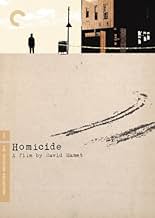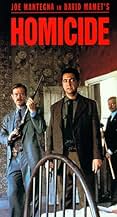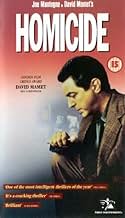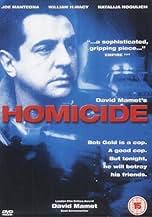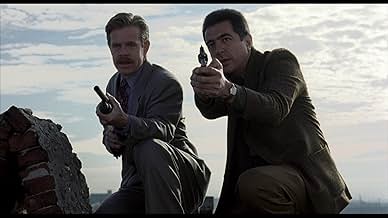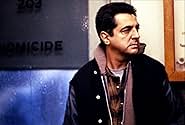IMDb रेटिंग
6.9/10
8.7 हज़ार
आपकी रेटिंग
अपनी भाषा में प्लॉट जोड़ेंA Jewish homicide detective investigates a seemingly minor murder and falls in with a Zionist group as a result.A Jewish homicide detective investigates a seemingly minor murder and falls in with a Zionist group as a result.A Jewish homicide detective investigates a seemingly minor murder and falls in with a Zionist group as a result.
- पुरस्कार
- 3 जीत और कुल 6 नामांकन
फ़ीचर्ड समीक्षाएं
While this picture could compare favorably with many of its type for nothing more than its use of action, suspense and realistic details regarding police work, it goes significantly further and becomes a character study of a man searching for an identity. A conscientious, no-nonsense detective, Gold has never become involved in his work to the extent that it has made him question his values, let alone his reason for existing. Without the point being forced upon us, we see a character with (seemingly) no home, no friends, no social activities: a decent man who has not connected with anything meaningful in life until circumstances force him to make significant choices.
Especially challenging to the viewer is the deliberately ambiguous ending in which there is reason to believe that Gold could choose either of the major alternatives available to him. He looks and feels like an outsider in the precinct. He now identifies with the Jew as an outsider. Could it be that he is actually considering.....?
See this provocative picture, and decide for yourself. Excellent performances and direction throughout.
Especially challenging to the viewer is the deliberately ambiguous ending in which there is reason to believe that Gold could choose either of the major alternatives available to him. He looks and feels like an outsider in the precinct. He now identifies with the Jew as an outsider. Could it be that he is actually considering.....?
See this provocative picture, and decide for yourself. Excellent performances and direction throughout.
While on his way to the case that will make his name, homicide detective Bobby Gold gets sidelined to the scene of a murder of an elderly Jewish woman in a candy shop. Present when the family arrives, Gold is then transferred from his case to this murder much to the annoyance and sympathy of the rest of his team. At first Gold resents the assignment and doesn't believe any of the paranoid theories about the murder put forward by the family, but digging deeper he finds there may be more to the case than he first thought.
I came to this film because I generally like the work of Mamet and specifically the great pattern and flow of dialogue that he delivers. And yet again, in this regard, I was not disappointed because the film does have a great flow to the script that gives each character energy and presence. I always struggle to describe what it is Mamet does (and have failed here as well) but it works and those that know of it will find more of it here. The problem for me does rather lie in the narrative though. The ending is quite unsatisfying and leaves many questions unanswered. Now, to me, I could accept this if the film was about Gold rather than the two cases in play, and, in a way I think that was the intension. However the script is not strong enough to make the film all about his character which is a shame because I wanted to understand him more.
Mantegna delivers the character well anyway. He is the heart of the film and his presence and delivery bring out Mamet's script. He is surrounded by a famous support cast, all of whom do equally as well with the dialogue even if they have lesser roles. Macy, Guastaferro, Wallace and others all turn in good support. So mostly a good film and certainly one that will appeal to fans of other work from Mamet. The narrative may leave some viewers feeling a bit disappointed but it still has enough forward motion and energy to engage throughout.
I came to this film because I generally like the work of Mamet and specifically the great pattern and flow of dialogue that he delivers. And yet again, in this regard, I was not disappointed because the film does have a great flow to the script that gives each character energy and presence. I always struggle to describe what it is Mamet does (and have failed here as well) but it works and those that know of it will find more of it here. The problem for me does rather lie in the narrative though. The ending is quite unsatisfying and leaves many questions unanswered. Now, to me, I could accept this if the film was about Gold rather than the two cases in play, and, in a way I think that was the intension. However the script is not strong enough to make the film all about his character which is a shame because I wanted to understand him more.
Mantegna delivers the character well anyway. He is the heart of the film and his presence and delivery bring out Mamet's script. He is surrounded by a famous support cast, all of whom do equally as well with the dialogue even if they have lesser roles. Macy, Guastaferro, Wallace and others all turn in good support. So mostly a good film and certainly one that will appeal to fans of other work from Mamet. The narrative may leave some viewers feeling a bit disappointed but it still has enough forward motion and energy to engage throughout.
I found the film as riveting and disturbing as most of the other reviewers, but I'd like to comment here on David Mamet's writing style. As one of the earlier reviews points out, Mamet is much admired by the literati, and as another says, he is studied in film schools. So I may be going out on a limb, but I am a lot less impressed with his writing than most.
David Mamet started as a playwright, and he still writes with the theater in mind, even when he writes for movies or TV. I first noticed this a year or so ago when watching a rerun of Hill Street Blues for which he'd written the script. The show had many first-rate TV writers, and there was nothing incongruous in the idea that a celebrated playwright would write an episode. But his episode, while intense, involving, and philosophical in the approved Mamet style, proved out of place as an episode in a long-running series with established characters. Mamet's Hill Street bunch lost familiar character traits and gained others common to nearly all the dramatis personae of his plays. The cops all talked like Mamet characters, had macho-philosophical Mamet dialogues, faced Mamet moments of truth.
Well, here is Homicide, another cop show in full length movie form, and once again his puppets talk like Mamet characters, rather than like distinguishable individuals. These roles are his own creations, so he isn't confronted with a series-watcher's expectations, but that hasn't made them more believable as people. His dialogue has a sameness about it that suggests he doesn't really listen to the way people talk. (Again, I realize this is a minority view: critics are always writing about the "gritty realism" of his characters' speeches.)
Listen to the dialogue from one of the NYPD Blue episodes written by David Milch. (I choose Milch not only because he's one of Blue's best writers [and co-producer, of course] but also because he wrote many of the best Hill Street Blues episodes around the time Mamet wrote his contribution.) The characters are varied, and their choice of words tells the listener more about them as individuals with every line they speak. Mamet characters tend to tell you, not what they are like as people, but what Mamet wants you to think about them. Again and again during Homicide I found myself thinking: "no, he wouldn't say that", or even "does anybody really talk that way?"
Am I saying David Milch is a better writer than David Mamet? I think I am, for realistic media like TV and film, anyway. The theater, as an inherently artifical medium, can absorb and even thrive upon artificiality in its dialogue. But TV and movies have different demands, and I don't think David Mamet meets them very well.
David Mamet started as a playwright, and he still writes with the theater in mind, even when he writes for movies or TV. I first noticed this a year or so ago when watching a rerun of Hill Street Blues for which he'd written the script. The show had many first-rate TV writers, and there was nothing incongruous in the idea that a celebrated playwright would write an episode. But his episode, while intense, involving, and philosophical in the approved Mamet style, proved out of place as an episode in a long-running series with established characters. Mamet's Hill Street bunch lost familiar character traits and gained others common to nearly all the dramatis personae of his plays. The cops all talked like Mamet characters, had macho-philosophical Mamet dialogues, faced Mamet moments of truth.
Well, here is Homicide, another cop show in full length movie form, and once again his puppets talk like Mamet characters, rather than like distinguishable individuals. These roles are his own creations, so he isn't confronted with a series-watcher's expectations, but that hasn't made them more believable as people. His dialogue has a sameness about it that suggests he doesn't really listen to the way people talk. (Again, I realize this is a minority view: critics are always writing about the "gritty realism" of his characters' speeches.)
Listen to the dialogue from one of the NYPD Blue episodes written by David Milch. (I choose Milch not only because he's one of Blue's best writers [and co-producer, of course] but also because he wrote many of the best Hill Street Blues episodes around the time Mamet wrote his contribution.) The characters are varied, and their choice of words tells the listener more about them as individuals with every line they speak. Mamet characters tend to tell you, not what they are like as people, but what Mamet wants you to think about them. Again and again during Homicide I found myself thinking: "no, he wouldn't say that", or even "does anybody really talk that way?"
Am I saying David Milch is a better writer than David Mamet? I think I am, for realistic media like TV and film, anyway. The theater, as an inherently artifical medium, can absorb and even thrive upon artificiality in its dialogue. But TV and movies have different demands, and I don't think David Mamet meets them very well.
I am a huge fan of Mamet and there's an excellent cast - even the mighty Roger Deakins as DOP. But this movie doesn't work. The dialogue is stilted and forced - surely the last thing you'd expect from a Mamet script - the main character is weak and not credible as a detective. The plot is all over the place and the ending highly unsatisfactory.
Some David Mamet films have incredible notoriety amongst the literate set (Glengarry Glen Ross, Oleanna, House of Games). His 2 Oscar noms (Wag the Dog, The Verdict) as well as his non-nominated script for The Untouchables have him firmly established with Hollywood's power base as well.
For my money, the oft-overlooked Homicide is a true Mamet gem--startling in its genius.
Put simply, Homicide is a revealing look at a man's journey into himself. Many will be distracted by the subject matter and tune out, but try to hang on.
Joe Mantegna's Bobby Gold is a tough cop who denies his Jewish lineage, until a low priority murder investigation into an aged Holocast survivor forces him to re-evaluate his entire existence. The resulting destruction of the man is cruel and never-ending, and brilliant.
William H. Macy, an until-now bit player, gets a well-deserved promotion to #2 man among the strong supporting cast as Gold's partner and sounding board.
The intricacies of the plot, the subtleties of the subtext, as well as the perfunctory Mamet attention to detail may mean a second, or third look is necessary for the viewer to get straight with what's going on------- but take the time, if you can, it just keeps getting better and better.
For my money, the oft-overlooked Homicide is a true Mamet gem--startling in its genius.
Put simply, Homicide is a revealing look at a man's journey into himself. Many will be distracted by the subject matter and tune out, but try to hang on.
Joe Mantegna's Bobby Gold is a tough cop who denies his Jewish lineage, until a low priority murder investigation into an aged Holocast survivor forces him to re-evaluate his entire existence. The resulting destruction of the man is cruel and never-ending, and brilliant.
William H. Macy, an until-now bit player, gets a well-deserved promotion to #2 man among the strong supporting cast as Gold's partner and sounding board.
The intricacies of the plot, the subtleties of the subtext, as well as the perfunctory Mamet attention to detail may mean a second, or third look is necessary for the viewer to get straight with what's going on------- but take the time, if you can, it just keeps getting better and better.
क्या आपको पता है
- ट्रिवियाThe film began as an adaptation of David Mamet's friend William J. Caunitz's 1986 novel "Suspects". However, the more Mamet wrote, the more his story diverged from the source material until, with Caunitz's blessing, Mamet left the source book behind entirely, until ultimately the script became an original screenplay.
- गूफ़When Detective Gold discovers the photo behind the picture, in the picture is a Hebrew sign referring to a road being built by the Labor Federation's (haHistadrut) Solel Boneh division. In the sign it's misspelled "Vistadrut - Solel Bono".
- भाव
Tim Sullivan: Bob, I'm gonna tell you what the old whore said, and this is the truest thing I know: "When you start cumming with the customers, it's time to quit."
टॉप पसंद
रेटिंग देने के लिए साइन-इन करें और वैयक्तिकृत सुझावों के लिए वॉचलिस्ट करें
- How long is Homicide?Alexa द्वारा संचालित
विवरण
बॉक्स ऑफ़िस
- US और कनाडा में सकल
- $29,71,661
- US और कनाडा में पहले सप्ताह में कुल कमाई
- $43,650
- 14 अक्टू॰ 1991
- दुनिया भर में सकल
- $29,71,661
इस पेज में योगदान दें
किसी बदलाव का सुझाव दें या अनुपलब्ध कॉन्टेंट जोड़ें




